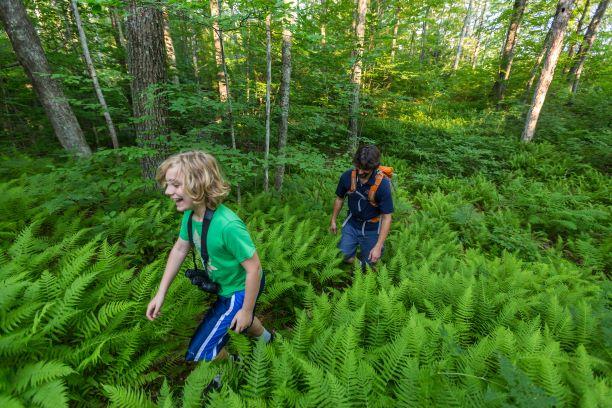- Tags:
- Recreation

This year, the Forest Society has partnered with Concord Hospital to present the 5 Hikes Challenge. Together, we’ll share wellness tips to keep you motivated throughout the challenge and the science behind the physical and mental benefits of time spent in nature. Here, Valerie Ferland of Concord Hospital explains the value of exercise.
By Valerie Ferland
The concept of consciously exercising for better health isn’t new and dates back as early at 3000 BC in China with the classic Yellow Emperor’s Book of Internal Medicine and in India with their principles of Ajur Veda. Today, the data and science linking exercise to better health (both physically and mentally) is well documented. And yet, even with all the evidence-based research telling us that exercise will lower our risk for chronic disease, improve our mental health and increase our lifespan, the majority of Americans struggle to get any exercise at all.
Perhaps we need a change of perspective. Exercise itself has become prescriptive with guidelines established that dictate how many days, how much time, what heart rate we should achieve and what exercise should be performed. It all sounds like a whole lot of work and not a lot of fun.
But what if we simply started to move more, not for the sake of moving, but for the pleasure of it? What if we weren’t sweating and out of breath or our muscles weren’t burning?
What if we only did it for a few minutes on random days and didn’t really think about exercise but just enjoyed and appreciated our bodies moving or the scenery or the company we are with? What does the data say about that?
Plenty. Regardless of time or intensity, when we move our body:
- Qe release endorphins (serotonin, norepinephrine, dopamine) that serve to improve energy and concentration, improve mood, increase focus and generally make us feel good.
- We simultaneously decrease the amount of ‘stress’ hormones (cortisol, adrenaline) which do the exact opposite of endorphins and negatively impact mental health.
- We increase and improve blood circulation which enhances cardiovascular and neurological systems:
~decreases the risk of chronic disease such as heart disease, cancer and diabetes
~lowers levels of anxiety and depression and improves sleep
~ creates new neurons (brain cells) and improves how those neurons work together to impact memory, emotions and even the aging process!
Whether you have 1 minute, 5 minutes or 45 minutes, no time is too little to receive the benefits of movement. Bring your movement outdoors and magnify the benefits!
Valerie Ferland, MS, is the Employee Wellness Coordinator at Concord Hospital.
